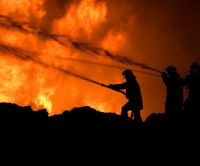

According to a new report wildfires like those that devastated California, Australia and Siberia will become 50% more common by the end of the century.
The report, by the UN Environment Programme (UNEP) and GRID-Arendal, a non-profit environmental communications centre, calls for a radical change in government spending on wildfires, shifting their investments from reaction and response to prevention and preparedness.
It found that there is even an elevated risk for the Arctic and other regions previously unaffected by wildfires, with a global increase of extreme fires of up to 14% by 2030, 30% by the end of 2050, and 50% by the end of the century.
The publication calls on governments to adopt a new "Fire Ready Formula", with:
Currently, direct responses to wildfires typically receive half of the related expenditures, whilst planning receives less than 1%. To prevent fires, UNEP and GRID-Arendal call for a combination of data and science-based monitoring systems with indigenous knowledge, and for stronger regional and international cooperation.
Inger Anderson, UNEP Executive Director, said: "Current government responses to wildfires are often putting money in the wrong place. Those emergency service workers and firefighters on the frontlines who are risking their lives to fight forest wildfires need to be supported".
"We have to minimize the risk of extreme wildfires by being better prepared: invest more in fire risk reduction, work with local communities, and strengthen global commitment to fight climate change".
The report concludes with a call for stronger international standards for the safety and health of fire-fighters, and for minimising the risk that they face before, during and after operations. This includes:
Professor Sally Archibald, an ecologist at the University of the Witwatersrand in Johannesburg, who was involved in the report, said: "This is a really important conclusion that I hope diverts money and resources in the right direction, as well as changing policies".
She stated that even though these changes are made, it cannot be promised that no more extreme fire events will occur, because these fires are caused by global climate change.
"But it would certainly help us minimise the impact and minimise the loss of damage".
For more information on this subject, see: